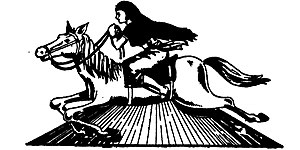Irai Ningthou: Difference between revisions
(Updating) Tags: Mobile edit Mobile web edit |
No edit summary Tags: Mobile edit Mobile web edit |
||
| Line 69: | Line 69: | ||
== Other websites == | == Other websites == | ||
{{Wikisource|Folk-Lore/Volume 24/The Religion of Manipur}} | {{Wikisource|Folk-Lore/Volume 24/The Religion of Manipur}} | ||
* [https://archive.org/search.php?query=Irai%20Ningthau&sin=TXT Irai Ningthou_archive.org] | * [https://archive.org/search.php?query=Irai%20Ningthau&sin=TXT Irai Ningthou_archive.org] | ||
| Line 75: | Line 74: | ||
[[Category:Meitei culture]] | [[Category:Meitei culture]] | ||
Revision as of 20:00, 15 March 2022
| Irai Ningthou (Old Manipuri: Ilai Ningthou) | |
|---|---|
God of Water | |
| Member of water deities | |
 The divine name "Irai Ningthou", written in Meitei Mayek abugida | |
| Other names | Irai Ningthau, Ike Ningthou, Ike Ningthau, Erai Ningthou, Erai Ningthau, Eke Ningthou, Eke Ningthau |
| Affiliation | Meitei mythology (Manipuri mythology) and Meitei religion (Sanamahism) |
| Abodes | Rivers and Lakes |
| Texts | PuYas |
| Gender | Male |
| Region | Ancient Kangleipak (Antique Manipur) |
| Ethnic group | Meitei ethnicity |
| Festivals | Lai Haraoba |
| Consort | Irai Leima (Ireima) |
Irai Ningthou (Old Manipuri: Ilai Ningthou) or Ike Ningthau (Old Manipuri: Ike Ningthou) is a God in Meitei mythology and religion (Sanamahism) of Ancient Manipur (Antique Kangleipak). He is the God and the divine male personification of water.[1][2] He mainly dwells in the rivers and lakes.[2][3] He is the consort of Irai Leima (alias Ireima). The divine couples are regarded as the spirits of the water bodies.[2][4]
Name
The name "Irai Ningthou" literally means "King of water" or "Chief of water".[5]
Worship
When a person gets ill after bathing in a water body, people believed that the water spirits (Irai Ningthou and his wife Irai Leima) had caught the person. To get well again, people worship the two deities. For this, the maibas perform the rites and rituals. The offerings include 2 eggs and 7 bamboo vessels filled up with rice paste.[6]
The Thadou people also highly honour the water deities. They offer wild sacrifices like white fowl, pig, dog or he-goat to the God.[7]
References
- ↑ T C Das (1945). The Purums 1945. p. 247.
- ↑ 2.0 2.1 2.2 (Great Britain), Folklore Society (1913). Publications.
- ↑ T C Das (1945). The Purums 1945. p. 247.
- ↑ T C Das (1945). The Purums 1945. p. 247.
- ↑ T C Das (1945). The Purums 1945. p. 247.
- ↑ T C Das (1945). The Purums 1945. p. 247.
- ↑ T C Das (1945). The Purums 1945. p. 247.
Other websites
